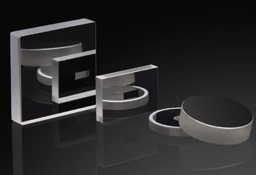 The recommended procedures for cleaning optics are largely the same whether you are working with lenses or mirrors. The typical cleaning process involves first blowing dust and dirt off the optical component with pressurized air, then using the drag method to slowly move moistened lens paper across the optical surface. We’ve previously shared tips for avoiding damage during optical cleaning. However, a few key differences make mirrors more susceptible to accidental damage.
The recommended procedures for cleaning optics are largely the same whether you are working with lenses or mirrors. The typical cleaning process involves first blowing dust and dirt off the optical component with pressurized air, then using the drag method to slowly move moistened lens paper across the optical surface. We’ve previously shared tips for avoiding damage during optical cleaning. However, a few key differences make mirrors more susceptible to accidental damage.
Here are three key points to keep in mind when cleaning mirrors:
- Only clean protected mirrors – Bare metallic coatings are delicate and can scratch easily when cleaned using regular procedures. Only mirrors with enhanced or protected surface coatings should be cleaned in this manner. If you must clean unprotected mirror surfaces, use compressed air only—no paper.
- Do NOT use dry lens paper – The use of lint-free lens paper, moistened with a cleaning solution, is important for cleaning of both lenses and properly coated mirrors; however, mirrors, especially, can be scratched by dry materials. Be sure to moisten your paper with a chemical solution before cleaning. Which brings us to the final point…
- Use the optimal reagent – When selecting chemicals for optical cleaning, the choices are generally 97-99% isopropyl alcohol, methanol, acetone, or mild detergent. Reagent-grade alcohol and acetone are most commonly used to clean mirror surfaces, and alcohol is often preferred. It will evaporate more quickly than acetone, thereby avoiding spots and streaks.
Download our tip sheet for complete lens and mirror cleaning procedures.
Ross Optical provides standard round, square, and elliptical mirrors. We can also make custom optics with the desired shape, size, and surface curvature for your specific application.
A variety of mirror coatings are available, including aluminum, silver, and gold, as well as protected and enhanced coatings. Our coating machines supply the best quality coating in terms of film hardness, laser damage threshold, and optical performance. Learn more about coating advancements that improve optical system performance.




